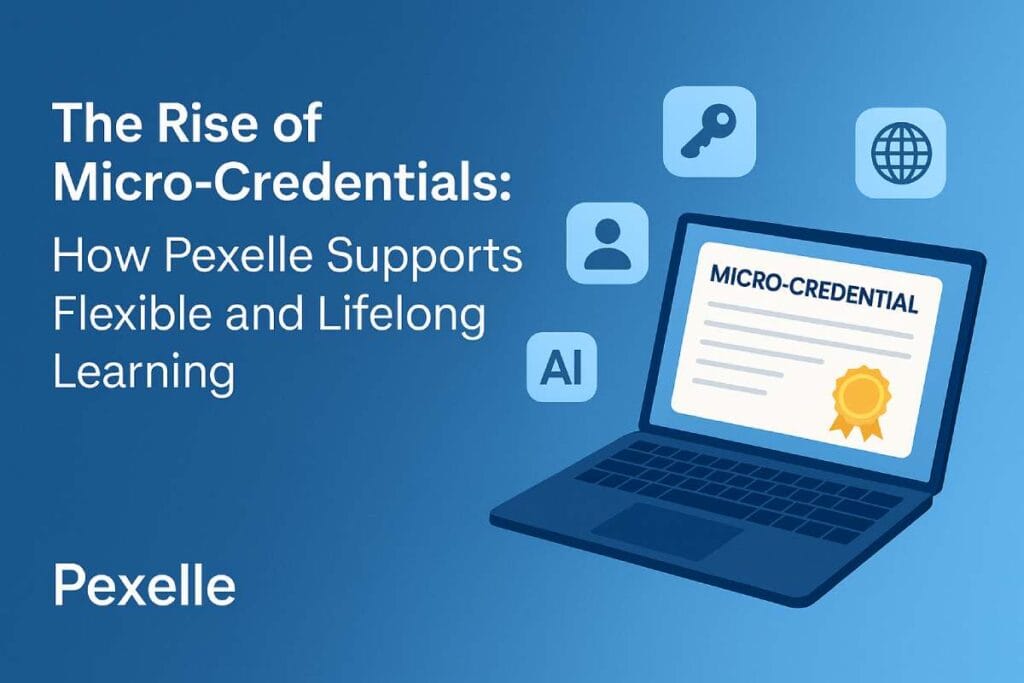The Rise of Micro-Credentials: How Pexelle Supports Flexible and Lifelong Learning

Introduction: A Shift in Learning Paradigms
For decades, traditional degrees have been the golden ticket to career opportunities. However, the rapid pace of technological innovation, automation, and globalization has exposed a critical flaw in this system: by the time a degree is completed, much of the knowledge it provides can already be outdated. In response, micro-credentials and nano-degrees have emerged as flexible, targeted, and faster alternatives. These learning pathways are reshaping how individuals acquire skills and how employers evaluate talent.
Pexelle is at the forefront of this transformation, enabling learners and organizations to embrace micro-credentials as part of a lifelong learning strategy.
What Are Micro-Credentials?
Micro-credentials are short, competency-based certifications that validate specific skills or knowledge areas. Unlike traditional degrees, they are modular, stackable, and often delivered online. For example, instead of studying a four-year program in computer science, a learner might pursue multiple micro-credentials in data analysis, cybersecurity, and AI development.
Employers increasingly value these certifications because they provide clear evidence of practical, job-ready skills. They are also adaptable: as industries evolve, new micro-credentials can be developed and obtained within months—not years.
Why Micro-Credentials Matter in the Future of Work
The rise of automation and artificial intelligence has created a paradox: while some jobs are disappearing, entirely new ones are emerging. Skills once considered niche—like blockchain development, cloud computing, or sustainable energy design—are now in high demand. Traditional education systems often struggle to keep pace with these changes.
Micro-credentials address this gap by:
- Focusing on skills, not titles – ensuring workers are valued for what they can do.
- Offering flexibility – learning can happen alongside work and personal commitments.
- Enhancing employability – certifications can be added incrementally, boosting resumes with each achievement.
This model makes learning truly lifelong, accessible, and relevant to shifting job markets.
How Pexelle Supports Micro-Credentials and Lifelong Learning
Pexelle goes beyond being a simple skills-matching platform. It creates a holistic ecosystem where micro-credentials become part of a learner’s evolving profile. By integrating advanced AI, labor market analytics, and global frameworks like ESCO and O*NET, Pexelle ensures that every credential earned aligns directly with employer needs.
Here’s how Pexelle empowers learners and organizations:
- Skills Passport: A digital record that showcases both formal qualifications and micro-credentials in one place.
- Personalized Learning Paths: AI-driven recommendations for the next most valuable credential based on market demand and personal career goals.
- Employer Integration: Companies can search for candidates with exact skill sets, validated by certified micro-credentials.
- Global Relevance: Whether in Africa, Europe, or Asia-Pacific, Pexelle connects learners with opportunities recognized across borders.
Conclusion: Building a Future-Proof Workforce
The future of education is not about replacing degrees entirely but complementing them with flexible, skills-focused alternatives. Micro-credentials empower individuals to adapt quickly, employers to hire with confidence, and societies to close the skills gap faster.
Pexelle’s mission is to make this transition seamless by providing the infrastructure for skills recognition, lifelong learning, and workforce adaptability. In a world where change is the only constant, Pexelle ensures that no learner—or skill—gets left behind.
Source : Medium.com




